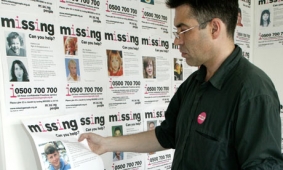
The government's strategy on missing children is welcome, but the reasons behind their flight must also be confronted
Information posters about missing children on the wall at a charity in west London. The government has unveiled a new strategy to improve help for missing people and their families. Photograph: Frank Baron for the Guardian
The government has published its strategy to identify and support children and adults who go missing. As the plan has acknowledged, children who go missing are at increased risk of sexual exploitation and abuse. They are sometimes running towards harm, even as they may be running away from it. There is no one-size-fits-all approach to mitigating the risks they face or preventing the harm they may experience. What is crucial about a missing episode is that it is more often a consequence, symptom or indicator of a problem, rather than a problem itself. If we really want to reduce the likelihood of children going missing, we need a commitment to address what causes them to run away from, or run to, harm.
For young women in particular, there is a multitude of reasons for going missing. A few days before the government's strategy was published, figures released highlighted that thousands of young women are subjected to so-called honour crimes. Many of them end up fleeing their immediate or extended families due to honour-based violence or forced marriage, and there are services that support them. These are young women who, in many cases, want their families to believe they are still missing. To reduce the missing rate, we need first to prevent the honour-based crimes that are committed against them.
Cases of female genital mutilation also contribute to missing cases. Based on intelligence published by the Home Office, thousands of girls are at risk of female circumcision and are removed from the UK in order for it to take place. For such a crime to be committed, they have to go "missing" from their local authority or schools. While their whereabouts may be known to their family, for those professionals who are seeking to protect them from harm these children are temporarily missing. Once again, in order to reduce missing episodes, it is female genital mutilation that needs to be prevented.
The government's strategy clearly outlines how missing episodes, particularly repeat episodes, are an indicator that a child is at risk of sexual exploitation. The strategy also rightly acknowledges that children may go missing as a result of sexual exploitation. In either circumstance, missing episodes cannot be addressed until the sexual exploitation is stemmed. Without this approach, we will never really get to the bottom of the missing episodes.
Children who repeatedly go missing have perhaps been treated as "streetwise" by many local authorities, and considered as less vulnerable than those for whom it is "out of character". They are deemed less likely to have been abducted. But practitioners working in the fields of sexual exploitation, female genital mutilation, forced marriage and honour-based violence know that repeat missing episodes indicate an increased vulnerability to ongoing harm.
Given the significance of missing episodes as an indicator of the harm experienced by children, practitioners seeking to protect them will welcome this co-ordinated approach by the government. Yet it is crucial that the message is consistent, both nationally and locally: that reducing missing episodes will not necessarily reduce the risks these children face. Only tackling the causes and consequences of missing episodes in a systematic way will protect children from abuse.
Carlene Firmin
• Carlene Firmin is a principal policy adviser at the Office of the Children's Commissioner for England. She is writing in a personal capacity.
Source: guardian.co.uk






